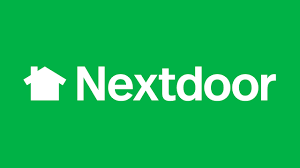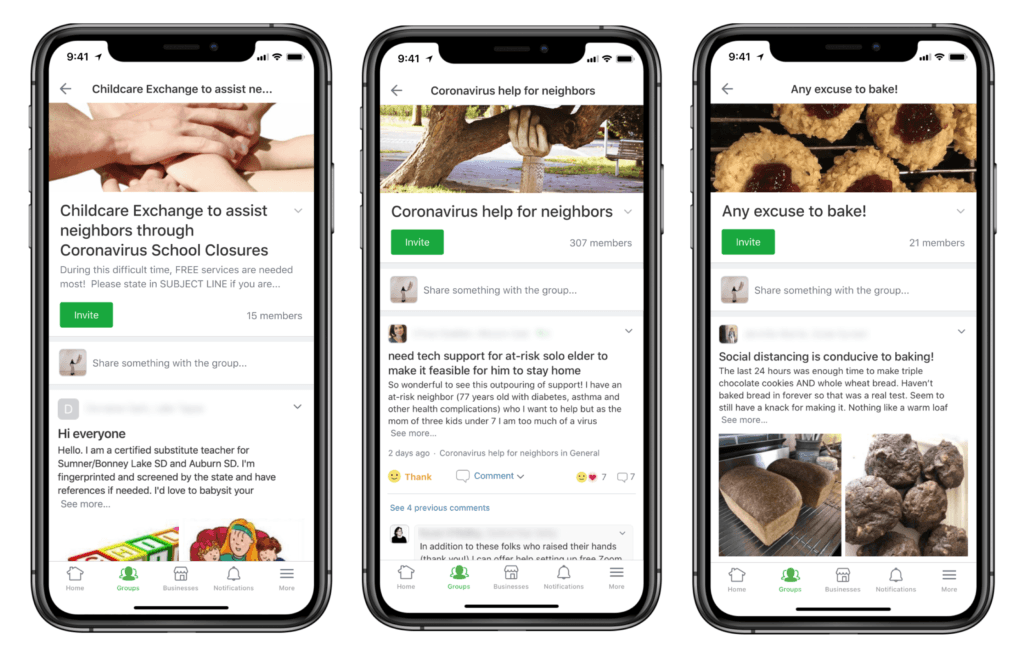NextDoor: Neighbors Help Neighbors as Your Street Block Goes Online

COVID-19 has made those that we love seem much further away. Next-door takes on the gigantic task of reacquainting people with the neighbors they never really had to meet or ask for help from, until now.
Nextdoor is a social networking app where users are grouped into their own neighborhoods. Since its founding in 2010 in San Francisco, it has grown to cover 260,000 neighborhoods across 11 countries, expanding into Europe. Similar to its large competitors, it operates a newsfeed and kept membership free. Unlike them, it puts a huge focus on identity verification done by phone or portal mail. Also unlike the incumbents which focus on drawing connections among friends as they move across countries in an increasingly mobile world, Nextdoor is built on proximity and ring-fences content only to one’s neighborhood instead of relying on a popularity algorithm to deal with the increasing volume of content. The team believed in helping neighbors establish a sense of community during a time where people increasingly lost touch with their local communities. They sought to rebuild social fabrics with the use of critical connectors or Founding Members. As a member of a neighborhood, residents had could discover other people and small businesses around them.
Neighborhoods’ importance suddenly became evident in early 2020 with the onslaught of COVID-19. As wide-sweeping social distancing policies to contain the virus’ spread increased, day-to-day life restricted itself to people’s immediate surroundings. People that were used to reaching out to further flung social networks suddenly found themselves limited to digital communication, from being unable do one’s regular visit to parents or fly across the country to celebrate milestones. Perhaps for the first time ever, people had to rely on the next-door neighbors they had never needed to meet – until Nextdoor. As of the last month alone, Nextdoor’s user engagement has increased in 80% especially in Seattle and New York. It has jumped over 100 slots in the App Store. Tennessee’s local officials have use Nextdoor as a primary channel for official communications to constituents.
At the start of 2020 and especially in the last month, Nextdoor has built, launched, and heavily publicized several new features that allow residents and businesses to extend help and ask for help.
- Groups: Nextdoor allows neighbors to create small groups within their neighborhood across interests that allow former strangers that happen to live one house apart to connect. Groups range from those that aim to directly help and redirect resources during COVID-19 such as elderly check in and babysitting, to those that aim to lighten the mood and enable more breathing space like hobbies and virtual social groups.
- Small Businesses Support: Next door has rolled out several small tools for local businesses such as COVID-ID banners, take out and delivery status displays, and gift card capabilities to help them reach their local consumers and adjust their dining business models.
- Help Maps: Nextdoor layers on a ask for help feature on its maps for neighbors to either ask for help or offer for help/list services they are willing to provided such as running errands especially for the elderly. This also allows neighbors to pool resources such as only doing one trip to the store on behalf of several people. This helps augment the already strained gig-economy workforces on DoorDash and Instacart, and also allows these on-demand services to be extended to those that would have ordinarily been unable afford continuous usage.
- Neighbors Helping Neighbors by Walmart – Just this week, Nextdoor announced a partnership with Walmart, that allows neighbords to pool together orders and aggregate Walmart trips.
While most of Nextdoor’s sudden surge in popularity and utility has been largely positive, the company is dealing with two unintended consequences. First, neighbors have used the platform to increase sometimes inappropriate social distance shaming towards non-compliant neighbors. Second, misinformation on the platform has increased as content volume increases. As a result, Nextdoor has started instituting poliicies on misinformation and reporting at this critical time.
Is Nextdoor’s growth fated to be only short-term? Yes and no. The platform’s growth is driven by COVID-19 circumstances, and its peak usage is likely to be during these black-swan events when the social networks people are used to turn to in crises are not in a position to help. Once COVID-19 subsides, people may revert and decrease their reliance on their neighbors. However, COVID-19 will have impact over the long term towards a new normal which may still require relying on proximity. More importantly, relationships formed during crucibles are unlikely to fade so quickly. The circumstances may have only helped nudge people to become better neighbors and better citizens. If a sense of local community and true bonds have developed between neighbors, they are likely to continue helping each other and helping their local businesses in the future.
Nextdoor can sustain growth in three areas as things go back to normal or towards a new normal.
- Nextdoor should continue its small business support and patronage and continue to innovation around these. It is most suited to give SMBs a platform where they are not crowded out by large business with infinitely larger marketing budgets while also having easy access to the local community similar to a phonebook. The pandemic has taught us that small businesses are especially vulnerable and often can only rely on their most loyal and local patrons.
- Nextdoor should continue to build neighborhood ties online, but also find ways to develop these connections offline. Once COVID-19 restrictions lift, people will be eager to socialize again and to express gratitude towards those that have helped them. They can utilize the community leaders to get neighbors to meet offline in person, building trust not only in the platform but also in the community in a virtuous cycle.
- Finally, Nextdoor should also explore expands its government partnerships similar to Tennessee’s initiative as a platform where civic responsibility and grow and be checked.
COVID-19 has ironically shown both the power and limits of digital technology. The future of social networks is likely omni-channel, and Nextdoor reminds us that when we need help, we need not go far to find it – its perhaps waiting just next door, like it used to be.
Sources:
https://www.washingtonpost.com/technology/2020/03/26/nextdoor-coronavirus-nicer/
https://www.newsobserver.com/news/coronavirus/article241642871.html





I always thought Nextdoor is a lost opportunity to revive local journalism. I don’t believe that the reason local journalism suffered in times of Facebook is because people aren’t interested in local news – but rather because Facebook never prioritized letting newspaper microtarget their audience, and audiences find local source of information.
I heard a lot about fake news on Nextdoor and wish they would use their particular local access to help local journalists as a platform to reach a smaller audience
Thanks for the article, super interesting! I hope after the crisis NextDoor can keep their communities engaged with the tools that add value for each neighborhood. I specifically liked two ideas mentioned in the article: help people leverage their communities and aggregate demand in the form of grocery deliveries. NextDoor could try to do more of this type of partnership as it would help them not only to increase demand but also to optimize last-mile deliveries and retailers/delivery services could even provide a discount for this. The second idea I liked is for NextDoor to be a tool of communication for government/police communication targeted to a specific neighborhood. I’ve seen similar apps in other countries where users can report any issues they have and also the major’s office can share information with a specific group of neighbors.
Thanks for the interesting article! I found fascinating how Nextdoor can help reducing the negative impacts of COVID-19. I completely agree that the company should focus on developing an strategy to going back towards a normal situation or a new normal. In relation to alternatives that you proposed, I believe that although the three initiatives are excellent options, the small business support and potential government partnership are relevant for the monetization of the platform. The second initiative related to continue building neighborhood ties online can be important for then selling the case to the government, but will not necessarily generate direct profits. Finally, the company should analyze the geographic expansion of the company since there are important fixed costs in the development of the platform.
This is really interesting. We all need good neighbors- and Nextdoor enables us to be good neighbors to each other during COVID-19. I love partnership with Walmart as a solution to the last mile delivery problems. (Last mile delivery activities tend to be the most expensive portion of delivery activities, and the hardest to get right.)
Like many relationship marketplace apps(e.g. dating apps, Homejoy), the more users on different ends of the transaction trust each other, the more likely they are to disintermediate the platform. Multihoming is also a problem. Once we’re not in a world that has recovered from COVID-19, how should Nextdoor manage relationships with alternative platforms e.g. Whatsapp to ensure it does not become substituted out?
Very interesting post. Thanks!
I agree with your recommendations and those look effective. In addition, I wonder the company can form a partnership with Zillow and provide a kind of community activity score that can show the neighborhood is safe and friendly. The score would be useful both for someone, like me, who is looking for new property and for the homeowners who might benefit from the price increase if the neighborhood is proven to be safe and therefore becomes popular.
Thanks for writing this! Great insights! I’m somewhat surprised by Nextdoor’s growth during this crisis, especially with the Groups that have elderly check in and babysitting. I would have thought that at this time when social distancing is crucial, people would be more reluctant to engage in closer physical contact with neighbors that they don’t usually engage with. I’m assuming they don’t usually engage with these neighbors since they have to use Nextdoor to connect with them. Also, I thought people would use other social media apps like Zoom, Houseparty, Facebook, and Whatsapp to have video calls with their close friends instead of using Nextdoor to speak to neighbors they don’t really know. Either way, it’s interesting to see how the app has managed to leverage this crisis to grow. This probably bodes well for their IPO ambitions in the next few years.